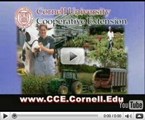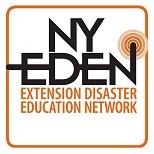Posted 7/24/2013
Cornell Cooperative Extension Receives WGY Christmas Wish Monies
Cornell Cooperative Extension in Fulton and Montgomery Counties recently received a $750.00 allocation from the 33rd Annual WGY Christmas Wish Campaign. WGY Christmas Wish monies will be used by the 4-H youth development program of Cooperative Extension to purchase materials to help implement local youth education programming focused on science and healthy living in school, afterschool, summer youth program and club settings with children in grades K-8. Programming outreach will include The Great Fossil Find, Seed Detectives, Lost Ladybug, Bird Sleuth Nature Detectives, From Cow to You, High Tech Agriculture. Exploring My Plate, and Are You Label Able?
The need for science, technology, engineering and math education is essential for today’s young people. 4-H programs prepare youth for the challenges of the 21st century by engaging them in a process of discovery and exploration. Science is interwoven into learning experiences through inquiry based opportunities that connect knowledge, skills and resources to practical application across multiple settings.
Posted 7/22/2013
by Bonnie

Cornell Cooperative Extension of Fulton and Montgomery Counties will be hosting a 4-H Pleasure Driving Show on Sunday, July 28, 2013 at the Fonda Fairgrounds starting at 10:00 a.m. 4-H Members from any county who wish to show much show a copy of their 4-H Project Horse Certificate signed by their 4-H Educator, proof that they have been successfully completed a 4-H Driving Evaluation, and a copy of the Rabies and Coggins Certificates. All driving must also turn in a copy of the CCE NYS Acknowledgement of Risk form signed by their parent. This form is available on the 4-H Member Resources portion of this website. Attached is the class list.
Posted 7/18/2013

Lasting Impressions – Understanding Fossils Wednesday, July 24, 2013 9am – 4pm
“Lasting Impressions- Understanding Fossils in the Northeastern United States” is a free, day-long workshop based on the 4-H project by the same name for youth ages 9 to 14. The workshop will be held in Canajoharie at the Cornell Cooperative Extension Office at 50 East Main St. Older youth are welcome to attend, but the workshop is unsuitable for younger children. Participants will learn about fossils in their own communities as well as develop skills in scientific inquiry. Youth will explore scientific concepts involved in finding and identifying fossils. Weather and transportation permitting, participants will search for fossils in an alternative location in the afternoon. Each participant should bring a bagged lunch and beverages.
For more details and to register on or before July 22, contact Extension Educator Bonnie Peck at 673-5525 extension 115 or email bsp8@cornell.edu.
Posted 7/18/2013
On June 28, 2013, Governor Andrew M. Cuomo issued a Disaster Declaration in response to the devastating floods that occurred between June 26th and July 3rd in the Mohawk Valley and Niagara County. On July 17, 2013, in response to the impact of these floods and the lack of approved federal disaster aid for individual assistance, the Governor announced the creation of the Mohawk Valley and 2013 Upstate Flood Recovery Program. This Recovery Program has been created to provide assistance to those homeowners, small business owners, and farmers who were victims of the floods; it is intended to provide immediate recovery assistance to victims and to address gaps in disaster related coverage, such as insurance.Through this program the impacted counties eligible for this assistance are also designated as Community Reconstruction Zones, providing additional funds for assistance with long-term recovery and planning to address future events.
This program constitutes a $16 million commitment of state dollars to provide much needed assistance in as timely a fashion as possible in order to get help where it is needed most, as quickly as possible. The available funds will offset costs associated with the floods that are not covered by other sources. Homeowners, small business owners, and farmers in the counties of Herkimer, Madison, Montgomery, Niagara, and Oneida may be eligible for funding.
Program details are still being finalized; complete application instructions and requirements are not yet available. Affected homeowners, small businesses owners and farmers are encouraged to visit the PRE-APPLICATION FORM to register today or to call the NYS Flood Helpline at1-888-769-7243 for information on how to receive assistance. All registrants will be contacted as soon as final application information is available.
Posted 7/18/2013
A Volunteer Center has been established at Haslett Park in Fort Plain, New York 13339. Volunteers can sign up to work at this location and get information about what work needs to be done. A shed to store equipment as well as some tools to be used by the volunteers for flood clean-up have been donated. Signs will be posted at the park soon.
The phone number for the Volunteer Center is 518-705-8695 and the email address is ftplainfloodhelp@yahoo.com.
Posted 7/18/2013
In past weeks, floods have devastated many areas in New York State. Although the floodwaters have receded, the clean-up and recovery period is just beginning. A pervasive after-effect of the presence of excessive moisture is the growth of mold in buildings and homes.
Molds can usually be detected by a musty odor and discoloration of surfaces. Molds grow on organic materials such as paper, leather, dirt and soap scum. They grow best at warm temperatures, but they can grow over a large temperature range. If you see or smell mold, you have a problem. The Extension Disaster Education Network (www.eden.lsu.edu) provides the following recommendations about the cleanup of mold. To view the entire article click on the link below.
Posted 7/11/2013

4-H educators and volunteers are looking for youth ages 8-13 years old to join them for a fun filled day learning about birds, their habitat, nature and much more! The Nature day will be held on Wednesday, August 7th from 9 a.m.- 4 p.m. at the Pine Tree Rifle Club at 419 Johnson Avenue Gloversville.
Highlights of the day will include a nature scavenger hunt, a bird walk, creating a bird feeder to take home, investigating bird beaks, creating a bird, nature activities and outside games.
Youth will be exploring and learning in an outdoor environment, so come dressed appropriately for outside fun. Each participant should bring their own lunch and drink. The cost of the day is $8.00 for non-4-H members and $6.00 for 4-H members. To receive a registration form call Cornell Cooperative Extension at 518-673-5525 or download the form attached below. Registrations are due by August 1st. Any questions contact Shannon Dygert by email at smd69@cornell.edu or call the CCE office at 673-5525 ext.122.
Posted 7/11/2013
“CCE In Your Community” is a Calendar of events and workshops that are open to residents of Albany, Columbia & Greene, Fulton & Montgomery, Rensselaer, Saratoga, Schenectady, Warren, Washington Counties. Attached is the entire calendar for your attention.
Posted 7/10/2013

WANTED: Forest Owner Volunteers or Help Spread the Forest Stewardship Message
Cornell Cooperative Extension is looking for a few good forest owner volunteers to meet and work with their neighbors. The NY Master Forest Owner Volunteer Program is entering its 23rd year with a new volunteer training scheduled for Sept. 25 to 29, 2013. Volunteers who complete the 4-day workshop will join the corps of 200+ certified volunteers across the state.
Sept. 25-29, at Cornell University’s Arnot Teaching and Research Forest, Van Etten, NY
Applications are due by September 11, 2013
Posted 7/3/2013

DEALING WITH FLOODED VEGETABLE FIELDS
Steve Reiners
Associate Professor in Horticultural Sciences
Cornell University
Record-breaking rains in eastern New York State have left many vegetable growers in dire straits. What had been shaping up to be a decent season has quickly turned into a nightmare with crops under water in many locations. Growers have been asking many questions as to what they can do in the short and long term. The following are recommendations pulled from many sources including Michigan State University, Ohio State University, Texas A and M, Florida State University, as well as Cornell.
FLOODS AND FOOD SAFETY
There are two types of flooding. The first is more typical and occurs after a heavy downpour when fields become saturated and water pools on the soil surface. This type of flooding can reduce yields and even kill plants but usually will not result in contamination of produce with human pathogens. The second type of flooding is more severe and unfortunately occurred with the recent storm. This occurs due to runoff from stream/river overflows will more likely be contaminated with human pathogens, as well as chemicals. Unless you are absolutely sure that flooding is not from streams and surface water, do not use fruits and vegetables that were at or near harvest at the time of flooding.











